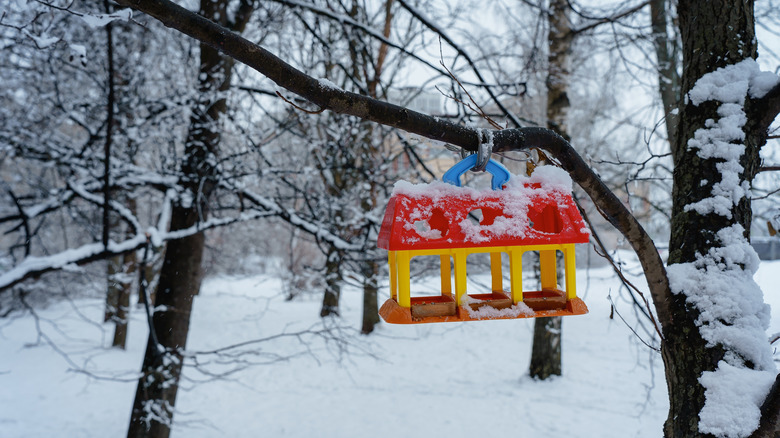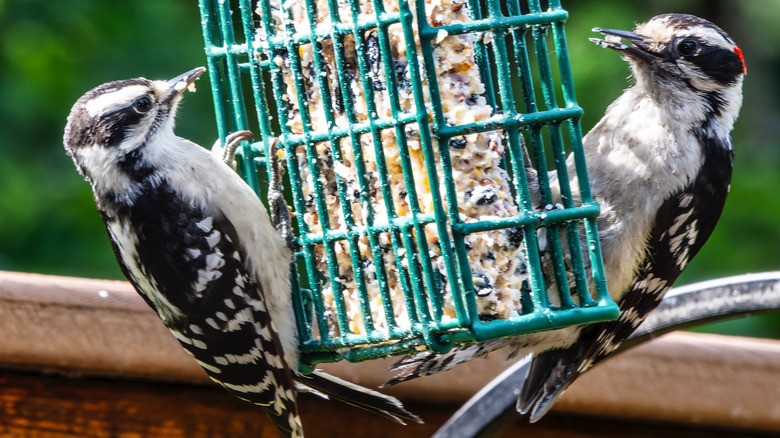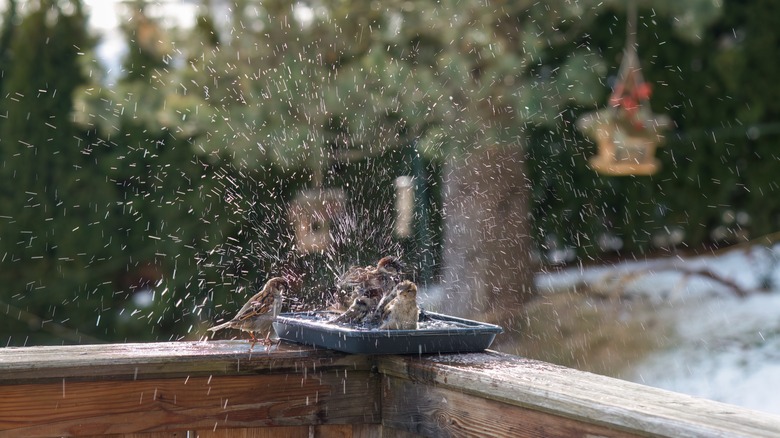This Is Why You Aren't Getting Any Birds At Your Feeder Over The Winter
If you've been looking forward to watching the birds this winter, it would sure be disheartening if your feeder was devoid of your feathered friends. But don't fret. Early in the season, birds may not be ready for supplemental food. They are still feeding from seed heads you've left for them and will approach natural sources first. However, if a few weeks have gone by, and you're still not seeing birds, the issue may be the contents of your feeder or the conditions surrounding it, such as accessibility and safety.
To optimize winter visits, you'll want the best foods to keep the birds in your yard happy this winter, along with a clean and safe feeder setup. But first, let's look at why we feed birds in the colder months. It's true that non-migratory birds can manage through the winter without your help. Feeders provide just 15 to 25% of their winter nutritional intake. But you're still giving birds a big boost when you offer supplemental feed because they need as much as 50% more food in winter, especially when it's below freezing. Research also shows that birds demonstrate higher winter survival rates during prolonged cold periods when they can access feeders. Winter feeding helps birds regulate their body temperatures. One study from the National Institutes of Health even found that the benefits of winter feeding stretch into the next season, increasing breeding productivity as measured by factors like success of fledgling offspring.
Provide birds with foods rich in calories and fat in winter
In the winter, birds need oil-rich foods that are high in fat and calories, which is why most experts recommend giving them black oil sunflower seeds. These nutritious seeds provide energy, are easy to eat, and appeal to a variety of birds. Other winter favorites include shelled or unshelled peanuts, peanut butter, fruit, and cracked corn. Suet, which is solid animal or vegetable fat, is popular with many birds, especially nuthatches and woodpeckers, and is available at big-box stores and garden centers. Even birds that prefer seeds will eat suet. Consider smearing peanut butter or suet on pinecones and then rolling them in black-oil sunflower seeds. Avoid mistakes when putting out suet this winter and place it in a caged feeder to prevent the birds from getting greasy buildup on their bodies.
Commercial seed mixes are, of course, available, but they tend to be wasteful and contain seeds birds don't like, such as flax seeds, rapeseed, red millet, and oats. Birds will eat what they enjoy and reject the seeds they don't like, which not only creates a mess, but it can also attract rodents or sprout into nearby plants. Feed consistently and follow sensible guidelines for what to do with your bird feeder in the winter. Feeders should provide a large capacity and be checked often for refilling. Clean feeders regularly with hot water and make sure they are kept in a safe location, away from predators like cats.
Birds need water in the winter, too
Birds are susceptible to dehydration in the winter, so you'll want to provide access to fresh water. A sturdy birdbath outfitted with an immersion heater allows birds to both quench their thirst and bathe. Keep the watering area clean and refill it as needed. If you do not have a heated birdbath but want to keep the water from quickly freezing, place it in a sunny location or in a dark-colored container or rubber bowl as they can absorb more heat from the sun.
When caring for birds in the colder months, keep in mind that some like to feed on the ground, so clear a spot for them, especially if it is snow covered. It's also a good idea to check with your local wildlife authority for any feeder regulations as some municipalities restrict the feeding period to cut down on attracting wildlife like deer or bears. Birds especially need your attention later in the winter (think February). At that time, natural food sources may be spent or inaccessible under snow. Be vigilant at this critical time and apply all the tips that are a must-know for feeding the birds in your backyard.


